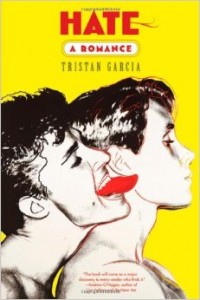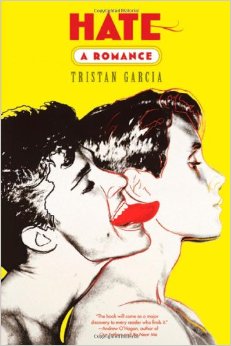 Hate: A Romance: A Novel
Hate: A Romance: A Novel
by Tristan Garcia
Translated from the French by Marion Duvert and Lorin Stein
Faber & Faber. 288 pages, $14.
TRISTAN GARCIA’S FIRST NOVEL, Hate: A Romance, has been marketed as a roman à clef about gay Paris in the 1980’s. Originally published in French in 2008 as La Meilleure Part des Hommes (“The Best Part of Men”), Hate tells the story of four French intellectuals who alternate tumultuously between being friends, lovers, and enemies as their lives are affected by the onset of AIDS, the “end of history,” and the assimilation of homosexuality. Hate is really a post-AIDS novel, however, not only because it begins in 1989, but also because its treatment of the plague as just one of several intellectual currents coursing through the narrative rises above the parochial approach that most other writers of AIDS fiction have taken.
“The eighties were a cultural and intellectual wasteland except when it came to TV, free-market economics, and Western homosexuality.” So declares Elizabeth Levallois, the passive Parisian cultural journalist who serves as the narrator. As is her wont—a French woman of letters—she is having an affair with a married man, Jean-Michel Leibowitz, a neoconservative Jewish academic in the original sense of the term, i.e., a Marxist who, repulsed by the radicalism of the left, gradually moved rightward. Jean-Michel, clearly based on philosopher Alain Finkielkraut, is the friend of Dominique Rossi, a gay activist and founder of the anti-AIDS organization stand.
Finally, there is William, the most colorful—and maddening—of the characters. A beautiful young man from the provinces who moves to Paris at the age of nineteen, he falls in, and then horribly and violently out of, love with Dominique, eventually staging a coup against him within stand (both men are HIV-positive). William soon becomes a noisy advocate of barebacking, proselytizing his cause with a fanaticism so fatalistic and nihilistic that readers may question how anyone other than a literary creation would put up with him. (“AIDS belonged to us queers, it was our treasure,” he tells Liz, whose function as omniscient narrator is to listen to William’s increasingly lunatic rants.) A pied piper for Paris’s vulnerable young gay men, he writes a column for a radical gay magazine, appears in drag on serious political chat shows, and gains stature as an intellectual celebrity in the way that only a Frenchman could.
Amid a background of irrational gay radicalism and rising anti-Semitism on the French left, Dominique and Jean-Michel find themselves unlikely allies, both having been betrayed by their erstwhile “communities.” To William, their evolutions are cynically and selfishly motivated: Dominique campaigns for HIV prevention because he wants to sell out gays for mainstream respectability; Jean-Michel’s shift to the right has brought him riches and esteem as he’s never experienced before (eventually landing him a post in the Sarkozy government). “You only switch sides if you can’t get off where you’re at,” William tells Liz.
Garcia, who is not gay, has an ear for the intellectual debates that have roiled France since the end of the Cold War, and through William (who eventually succumbs to AIDS) and Dominique, he frames gay life since liberation as having stared down two successive existential crises: the actual threat of physical decimation at the hands of a ghastly plague, and the philosophical question of what it should mean to be homosexual in the modern world. The assimilationist view of the gay “community” is encapsulated by Garcia’s description of Dominique, who “paradoxically saw its victory as its dilution, its integration into society.”
________________________________________________________
James Kirchick is writer-at-large with Radio Free Europe/Radio Liberty, based in Prague, a contributing editor to The New Republic, and a columnist for The Advocate.






